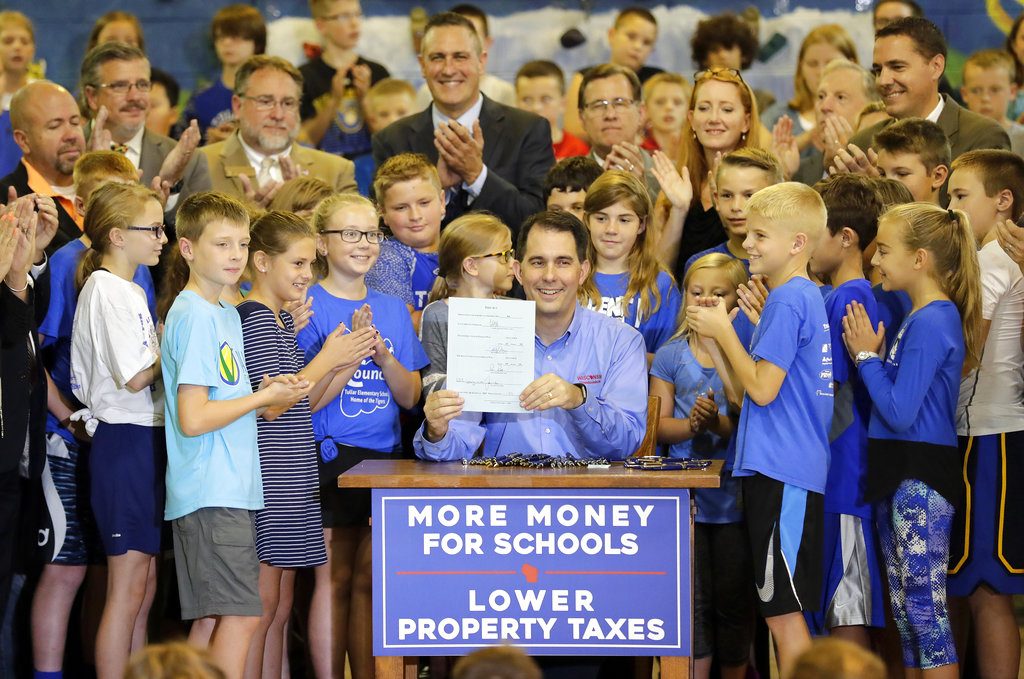Walker signs state budget in advance of re-election run
By: Associated Press//September 21, 2017//

By SCOTT BAUER
Associated Press
MADISON, Wis. (AP) — Wisconsin Gov. Scott Walker on Thursday signed the state’s long-delayed budget, a spending plan he will tout as he travels the state as he gets into full-time campaign mode for his re-election bid next year.
Walker signed the budget at an elementary school in Neenah, emphasizing the two-year spending plan’s nearly 6 percent increase in K-12 funding, its freeze on University of Wisconsin tuitions and its property tax cuts for the typical homeowner. The budget would also eliminate Wisconsin’s remaining prevailing-wage laws for state construction projects immediately upon taking effect. A previous version of the plan would have postponed the repeal until Sept. 1, 2018, but Walker vetoed that delay period on Wednesday.
“We’re thrilled about the things that are in here,” Walker said, standing in front of students who later gathered with Republican lawmakers around the governor as he signed the bill into law.
The $76 billion plan, which should have been completed by July 1, is the only bill that must pass this session. It pays for the priorities of Walker and Republicans who control the Legislature.
Democrats who have announced plans to challenge Walker in the governor’s race are criticizing the budget’s tax cuts, which will primarily benefit the wealthy. They are also calling attention to the budget’s lack of a long-term road-funding plan and education funding that they say doesn’t go far enough to make up for previous cuts.
“Without question we can fix our roads and fund our schools at the same time,” said state Superintendent Tony Evers in his annual state of education speech at the Capitol, which took place at the same time that Walker was signing the budget. “We have to push past the politics and dare greatly. We need some adults in the room.”
In what sounded a lot like a gubernatorial stump speech, Evers invoked Teddy Roosevelt — but never mentioned Walker — saying we live in “challenging times.” He called for finding long-term plans for roads and education and repeated the Democrats’ call to accept federal money to expand Medicaid, saying such a step would free up more money for schools and other priorities.
His tone was markedly more critical than in February, when he praised Walker’s budget, which allocates $639 million more to K-12 schools. Evers had then called the plan “pro-kid” and “an important step forward.”
Other Democrats challenging Walker also said the budget falls short of meeting the state’s needs.
The political activist Mike McCabe said finding more money for roads took a backseat to providing tax cuts to the wealthy. The budget eliminates the alternative minimum income tax, which is primarily paid by people making between $200,000 and $500,000 a year.
The Milwaukee businessman Andy Gronik said Walker put special interests ahead of priorities that real people care about, such as schools and roads. Bob Harlow, a recent Stanford University graduate and a political newcomer, said the budget doesn’t do enough to help public schools.
Democratic state Rep. Dana Wachs, of Eau Claire, voted against the budget but was in a meeting and wasn’t immediately available to comment Thursday.
Republican lawmakers who voted for the budget have also expressed disappointment that it relies on $400 million in additional borrowing to pay for roads and also delays ongoing projects. To raise some new money for road, the plan imposes a new fee on hybrid and electric vehicles.
There’s also been bipartisan criticism for one of Walker’s 99 partial budget vetoes. He struck down an increase in revenue caps on low-spending districts, a priority for Assembly Republicans, saying he worried about giving those mostly rural schools the ability to get more money from local property taxes.
One of the harshest critics of that veto, the budget committee co-chair Rep. John Nygren, said there was still a lot to like.
“There is something in this budget to help everyone and I believe it is an easy budget to support,” he said in a statement.
Walker suggested earlier this week that he’s likely to officially launch his campaign for a third term in early November, a year before the general election.
Dan Shaw of The Daily Reporter also contributed to this report.
Legal News
- Wisconsin attorney loses law license, ordered to pay $16K fine
- Former Wisconsin police officer charged with 5 bestiality felony counts
- Judge reject’s Trump’s bid for a new trial in $83.3 million E. Jean Carroll defamation case
- Dozens of deaths reveal risks of injecting sedatives into people restrained by police
- The Latest: Supreme Court arguments conclude in Trump immunity case
- Net neutrality restored as FCC votes to regulate internet providers
- Wisconsin Attorney General asks Congress to expand reproductive health services
- Attorney General Kaul releases update at three-year anniversary of clergy and faith leader abuse initiative
- State Bar leaders remain deeply divided over special purpose trust
- Former Wisconsin college chancellor fired over porn career is fighting to keep his faculty post
- Pecker says he pledged to be Trump campaign’s ‘eyes and ears’ during 2016 race
- A conservative quest to limit diversity programs gains momentum in states
WLJ People
- Power 30 Personal Injury Attorneys – Russell Nicolet
- Power 30 Personal Injury Attorneys – Benjamin Nicolet
- Power 30 Personal Injury Attorneys – Dustin T. Woehl
- Power 30 Personal Injury Attorneys – Katherine Metzger
- Power 30 Personal Injury Attorneys – Joseph Ryan
- Power 30 Personal Injury Attorneys – James M. Ryan
- Power 30 Personal Injury Attorneys – Dana Wachs
- Power 30 Personal Injury Attorneys – Mark L. Thomsen
- Power 30 Personal Injury Attorneys – Matthew Lein
- Power 30 Personal Injury Attorneys – Jeffrey A. Pitman
- Power 30 Personal Injury Attorneys – William Pemberton
- Power 30 Personal Injury Attorneys – Howard S. Sicula











